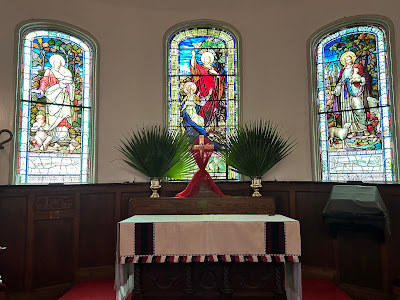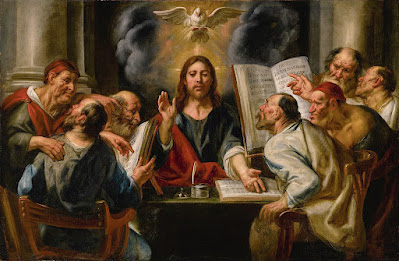Rituals
A Sermon for the Fifteenth Sunday after Pentecost
September 1, 2024
The Rev. Robin Teasley
When the Pharisees and some of the scribes who had come from Jerusalem gathered around him, they noticed that some of his disciples were eating with defiled hands, that is, without washing them. (For the Pharisees, and all the Jews, do not eat unless they thoroughly wash their hands, thus observing the tradition of the elders; and they do not eat anything from the market unless they wash it; and there are also many other traditions that they observe, the washing of cups, pots, and bronze kettles.) So the Pharisees and the scribes asked him, “Why do your disciples not live according to the tradition of the elders, but eat with defiled hands?” He said to them, “Isaiah prophesied rightly about you hypocrites, as it is written, ‘This people honors me with their lips, but their hearts are far from me; in vain do they worship me, teaching human precepts as doctrines.’ You abandon the commandment of God and hold to human tradition.”
Then he called the crowd again and said to them, “Listen to me, all of you, and understand: there is nothing outside a person that by going in can defile, but the things that come out are what defile.” For it is from within, from the human heart, that evil intentions come: fornication, theft, murder, adultery, avarice, wickedness, deceit, licentiousness, envy, slander, pride, folly. All these evil things come from within, and they defile a person.” Mark 7:1-8, 14-15, 21-23
I’m guessing many of us had a bedtime ritual when we were children. My mother always said the same prayer with us every night as we were tucked into bed. It made me feel safe and loved, it was comfortable. Rituals may change as we mature, I no longer pray that same bedtime prayer, but the ritual is still there, giving me a time and place to encounter God’s love.
Even after we have grown up, we live our lives in rituals and traditions. We all do things a certain way, we want things done a certain way. These are human traditions. Newly married couples spend a good amount of time that first year (and maybe for their entire marriages!) figuring out rituals and traditions. You know, important things like how to load the toilet paper on the dispenser. Should it roll over or under? Should the utensils be placed up or down in the dishwasher? What foods must be on the Thanksgiving table every year?
We all have our rituals, the way we have always done things. Doing things in the same order can be helpful, otherwise we might forget something, like our morning pills or our lunch box.
Rituals can be found in every society, past or present. Our public life is full of rituals. We say the pledge of allegiance and sing the national anthem; we have parades, inaugurations, and graduations. Fourth of July fireworks and back to school shopping. Rituals can express and reinforce the shared values and beliefs of a society.
At church, we engage in a ritual that we call liturgy. There are baptisms, confirmations, weddings, and funerals. There’s Homecoming Sunday and the Blessing of the Animals. The Sunday liturgy unfolds in the same way every week and we know what comes next (Opening prayer, readings, sermon, creed, prayers, confession, bread and wine.) Liturgy is a communal response to the sacred presence of God as we offer praise and thanksgiving. The rhythms and words of the liturgy are deep in our hearts.
This is why, when we find ourselves in trouble or grief, we are comforted in simply hearing people around us say the words that we, for a time, may not be able to say. It’s why the music can bring us to tears, unlocking the emotions we have been holding inside. We are pulled into the presence of God even when we do not have the strength to bring ourselves. This is the power of the ritual of liturgy.
In and of itself, ritual is a good thing, but sometimes we find ourselves going through the motions, or not going to church at all. Other times we hold on too tightly to our rituals, our human traditions. We can’t imagine letting go of our long-running programs, or our favorite ministries, because we’ve always done it that way, never allowing the Spirit to blow in the fresh air of change. We become too attached to our rituals, focusing on the ritual itself, rather than where it is designed to lead us – to God’s heart.
This is what was happening to the Pharisees and scribes in our gospel reading today. They were so concerned with their outer rituals that they were neglecting the heart of the matter, the commandment of God. Jesus was not condemning their rituals; he was addressing the fact that while their rituals were making them appear clean on the outside, on the inside their hearts were far from God.
The Pharisees and scribes were mistaken in thinking all this washing of hands, cups, pots, and kettles was going to clean their hearts. They were so distracted by the ritual that they could not see that they were no longer doing the work of God. They were keeping all the ceremonial traditions, all the outer symbolic liturgical acts, but they were not keeping God’s commandment in their hearts. They were being less than honest with themselves, and their rituals had consumed them. They could not begin to imagine that God might be calling them to change, to grow, to open their hearts. And Jesus called them hypocrites.
We can come to church and participate in worship and in the various ministries of the parish, but if we leave here and continue to react in anger to our loved ones or to those with whom we disagree, if we ignore God’s call for us to care for the suffering, then we too might be hypocrites.
We are pretending if we are more concerned with the way we’ve always done things in worship than we are with why we are here to worship and to be equipped to serve others. Because when we focus more on the ritual than on the presence of Christ in our midst, God’s love cannot be grafted in our hearts or shared with our neighbor. I think this is what James is getting at when he wrote “But be doers of the word and not merely hearers who deceive themselves.”
It's as if Jesus and James are in conversation with one another. Both the hearing and the doing are important, in fact, they are connected and support each other. We may be doers out in the world, volunteering and advocating for those who are powerless, but if we are not doing what we do in the name of God, if we skip over taking the time to discern what God wants us to do, then the ones we help will not come to know the love of God.
Whenever we find ourselves spiritually dry, just going through the motions, we may want to examine our current rituals and habits. And if we are out in the world, doing good for others, not with joy in our heart but rather with a sense of self-righteousness, we might want to explore what is missing.
This is why it’s so necessary for us to be not only out in the world, but also faithful in worship.
We come here and the framework of the liturgy pulls us into God’s presence, much like those bedtime prayers and childhood rituals that centered and held us. We connect with God and one another, as God grafts love in our hearts, increases in us true religion, nourishes us with all goodness, and brings forth in us the fruit of good works.










Comments
Post a Comment